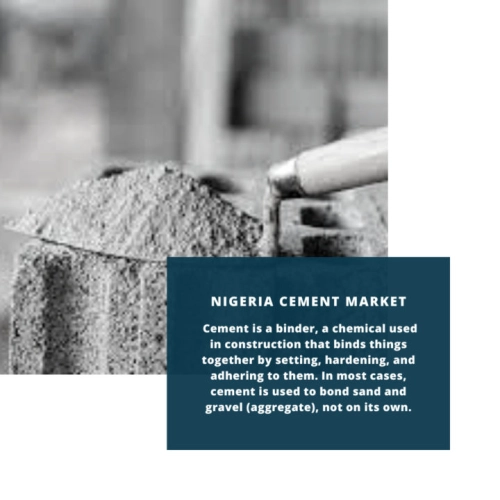
- Get in Touch with Us

Last Updated: Apr 25, 2025 | Study Period: 2022-2030
Cement is a binder, a chemical used in construction that binds things together by setting, hardening, and adhering to them. In most cases, cement is used to bond sand and gravel (aggregate), not on its own.
Mortar for masonry is made from cement mixed with fine aggregate, and concrete is made from cement combined with sand and gravel. Concrete is the most often utilised substance on earth and the second most-consumed resource after water .
Construction cement is typically inorganic, frequently lime or calcium silicate based, and can be classified as either hydraulic or non-hydraulic depending on how well it sets in the presence of water (see hydraulic and non-hydraulic lime).

The dry materials and water in hydraulic cements, such as Portland cement, react chemically to set and become adhesive. Mineral hydrates, which are formed as a result of the chemical reaction and are not particularly water soluble, are quite durable in water and resistant to chemical attack.
This makes it possible to set in damp environments or under water and further shields the material against chemical attack.
The NIgeria Cement market accounted for $XX Billion in 2021 and is anticipated to reach $XX Billion by 2030, registering a CAGR of XX% from 2022 to 2030.
Most cement is sold in bulk, some of it is sold in bags. Cement brands are widely available, with the Dangote brand holding a respectable amount of the market share.
The primary consumers of cement in Northern Nigeria include building contractors, construction firms, block-making businesses, and private citizens.
Despite his relatively recent entry into the industry, Dangote is currently by far Nigeria's biggest cement producer.Nigeria's second-largest manufacturer is Lafarge Africa.
It has five factories spread over four locations: Ewekoro and Sagamu in Ogun State, Mfamosing in Cross River State, and Ashaka in Gombe State. It is a subsidiary of the Holcim Group5, the largest cement producer in the world.
Natural gas, imported and domestic coal, as well as some domestic petroleum6, have historically been used in Nigeria's cement industry to provide heat for the co-processing of limestone into clinker, the primary component of cement.
Although there are plenty of fossil fuels in Nigeria, Lafarge Africa has taken the lead among the nation's cement manufacturers in increasing the usage of bioenergy.
| Sl no | Topic |
| 1 | Market Segmentation |
| 2 | Scope of the report |
| 3 | Abbreviations |
| 4 | Research Methodology |
| 5 | Executive Summary |
| 6 | Introduction |
| 7 | Insights from Industry stakeholders |
| 8 | Cost breakdown of Product by sub-components and average profit margin |
| 9 | Disruptive innovation in the Industry |
| 10 | Technology trends in the Industry |
| 11 | Consumer trends in the industry |
| 12 | Recent Production Milestones |
| 13 | Component Manufacturing in US, EU and China |
| 14 | COVID-19 impact on overall market |
| 15 | COVID-19 impact on Production of components |
| 16 | COVID-19 impact on Point of sale |
| 17 | Market Segmentation, Dynamics and Forecast by Geography, 2022-2030 |
| 18 | Market Segmentation, Dynamics and Forecast by Product Type, 2022-2030 |
| 19 | Market Segmentation, Dynamics and Forecast by Application, 2022-2030 |
| 20 | Market Segmentation, Dynamics and Forecast by End use, 2022-2030 |
| 21 | Product installation rate by OEM, 2022 |
| 22 | Incline/Decline in Average B-2-B selling price in past 5 years |
| 23 | Competition from substitute products |
| 24 | Gross margin and average profitability of suppliers |
| 25 | New product development in past 12 months |
| 26 | M&A in past 12 months |
| 27 | Growth strategy of leading players |
| 28 | Market share of vendors, 2022 |
| 29 | Company Profiles |
| 30 | Unmet needs and opportunity for new suppliers |
| 31 | Conclusion |
| 32 | Appendix |